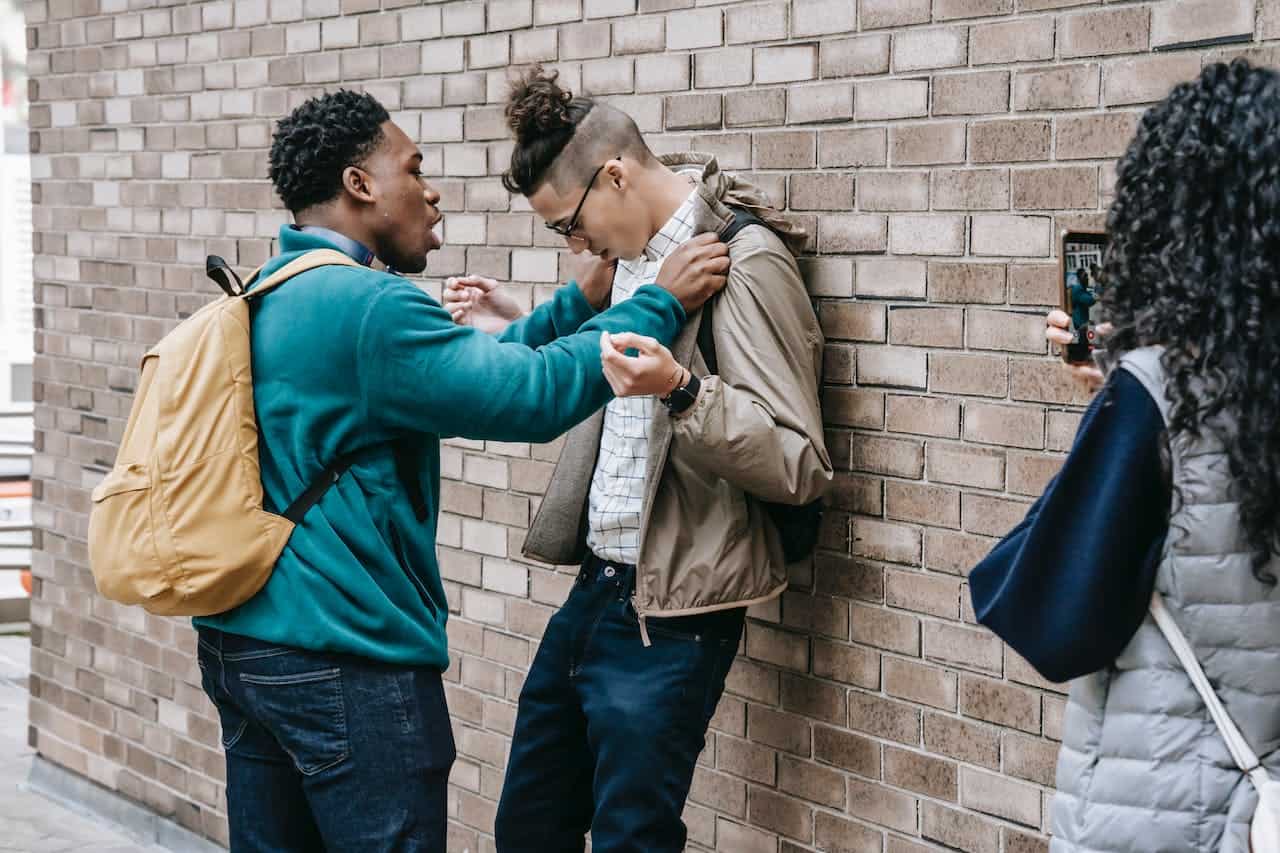We are humans and have emotions. It is the beauty of this universe that we have different natures. Sometimes two humans have two different and opposite views on a single point—it happens to everyone, even teens.
Teens can face issues with friends about plans and sometimes with family about rules at home. Or they can face challenges in school, leading to conflicts with peers or teachers.
Conflicts are normal—but keep in mind that things get worse if we ignore them. It can spoil relationships.
What is conflict resolution for teens?
Resolving conflicts means finding calm solutions without making things crazy. It’s about fixing problems without stirring up more mess.
Sometimes someone hurts us, and sometimes we hurt someone. Or, if we say it another way, we disagree with someone about something.
So can’t we find a middle ground?
Why not? Every problem has a solution. Every disagreement have some middle ground. Caring about your own feelings as well as the feelings and emotions of others is a very important element.
Conflict resolution for teens is like the glue that keeps teenagers working together.
Key principles of conflict resolution
So, in this conflict-solving process, a few important things come into play.
Talking: Express your thoughts calmly, as you share something and do not turn it into a big argument.
Understanding others: The difference of thoughts is actually the beauty of nature. Everyone has its own point of view and everyone has to accept this fact. Try to see things from others’ side, step into their shoes, and get why they’re feeling a certain way.
Listening: Try to listen the feelings behind the words. It’s not just hearing words; it’s catching the vibe behind ’em. Pay attention to why someone is feeling the other way, not just what they’re saying.
Managing emotions: Picture yourself in the Zen zone. Stay cool, take deep breaths, especially when things get a bit wild.
Common Teen Conflict Scenarios

Friendship Fights:
What type of life would it be if we exclude “friends” from it? They’re awesome, but sometimes they hit a speed bump. It’s normal, disagreements on plans or opinions, like choosing between pizza or burgers. No biggie, right?
Family Feuds:
Parents are like gardeners. The gardener prunes every branch that grows in the wrong direction. It is actually in favor of the plant.
Family time is not always sunshine. Rules and decisions can stir things up. For example, “Why can’t I stay out late?” or “Why so many rules?” happens to everyone.
School Struggles:
School life? It’s a rollercoaster. You can have problems with classmates or teachers, which can spark conflicts. The cause may be group projects or you couldn’t get the grade you hoped for. Stressful, but we’ve all been there.
Love Life Issues:
Romantic relationships are cool, but challenges sneak in. Different opinions or misunderstandings can cause conflict.
In the teen jungle, conflicts pop up, but it’s just life’s way of keeping things interesting, right?
Practical Tips for Teens on Conflict Resolution
Alright, let’s get real about resolving conflicts.
Steps to follow:
The way to resolve conflicts is very simple.
First, whatever is happening, cool yourself down and come to peace.
Then, share your heart with others and solve the problem. Bring it up.
Now, work together as a team to find a solution to the problem and agree on whatever solution comes out. Everyone can solve every problem with empathy and cooperation.
“I” Statements:
When you express your feelings, here’s an easy tip: say “I feel” instead of pointing fingers. Like, “I feel upset” instead of “You always mess up.” This approach facilitates a non-negotiable discussion of charges.
Avoid Blaming:
Here’s how to avoid blaming others because it doesn’t solve anything. It will help you become more social. Instead of saying, “You did it,” say, “Let’s have a conversation.” Do it and explain what the problem is. It’s always better to skip the drama and address the problem directly.
Teaching Conflict Resolution Skills to Teens: (Tips for parents of teens)

Let’s talk about something super important—helping your amazing teens with conflict resolution! If they pay attention to it, as it belong to leadership skills.
Your Role:
You’re the superheroes here. Teach conflict resolution to your teens and pass on your wisdom and lifelong experiences. You are responsible for teaching them how to talk things out and find solutions. If you don’t teach your children how to face life’s challenges, who else will?
School Connection:
School is not just a place to learn from books, but an environment where your teen learns an additional skill: conflict resolution. It’s like an extra tool in their backpacks, helping them find the best solution to the challenges of social situations.
Outside the Classroom:
One of the best things is that learning doesn’t just happen inside the classroom. Our daily activities are like hidden training opportunities. These opportunities help our teenagers resolve conflicts and turn real-life opportunities into valuable lessons.”
So, parents are the guides, schools are the partners, and daily activities are the practice field. Together, we’re helping your teens ace the conflict resolution game! Easy, right?
How do you handle a conflict in youth in five steps?

Here are five steps to effectively handle a conflict in youth:
- Stay calm and take some deep breaths during the conflict. Emotional reactions can escalate the situation.
- Listen attentively and show empathy. In this way, they will express their thoughts and feelings without hesitation.
- Ask questions to clarify the real issue and try to identify the root cause of the conflict.
- Instead of leaning towards one side, make a decision based on justice. Aim for mutually agreeable solutions that address the concerns of all parties involved.
- Once a resolution is reached, work together to implement it. Celebrate successes along the way to reinforce positive behavior.
Challenges in Teaching Conflict Resolution to Teens
Let’s dive into the challenges of teaching conflict resolution to teens.
Teen Resistance:
Some teens might roll their eyes and wonder, “Why bother?” It’s crucial to explain why this stuff matters. Think of it like explaining the “why” behind a game—it’s not just rules; there’s a point to it, like leveling up in life skills.
Cultural Differences:
Now, here’s a cool twist—different backgrounds bring different perspectives on conflicts. It’s like having different flavors in a dish. Understanding these differences is key, helping teens see that there’s no one-size-fits-all approach to conflict resolution.
Power Imbalances:
Sometimes, one person has more weight and more say in things. It’s like solving a puzzle with uneven pieces. These power imbalances can make resolving conflicts a bit trickier. Recognizing and addressing this is like figuring out how to balance that seesaw.
So, in the challenge zone, teens might question why, backgrounds can be like different spices and power imbalances are a bit like uneven seesaws.
Conflict resolution activities for teenagers
Role-Playing Scenarios:
Create scenarios based on real-life events that could cause potential conflicts, such as disagreements between friends, parental misunderstandings, or classmate defections. Ask the youth to play a different role each time so they can experience communication, empathy, and different perspectives.
Collaborative Problem-Solving Challenges:
Give them a challenge that aims to solve together as a team. It can be based on problem-solving or teamwork working in harmony to achieve a common benefit.
Journaling and Reflection:
Provide each youth with a journal and ask them to write about conflict situations. In this way, they experience their feelings, thoughts, and possible solutions.
Mediation and Negotiation Exercises:
In a mediation, play the roles of a young mediator and various parties. It helps them to listen to each other and solve problems.
Team Building Activities:
Organize team-building activities that build trust and consensus. These add to the team’s support through various challenges and cooperative games.
Related article: Conflict resolution activities for teens
Future Benefits of Conflict Resolution Skills for Teens
Let’s peek into the future benefits of mastering conflict resolution skills—it’s like unlocking superpowers for awesome teens!
Stronger Relationships:
Imagine conflict resolution as a secret sauce for relationships. When you’re good at it, you build better connections with friends, family, and even future pals. It’s like adding an extra layer of glue to keep bonds strong.
Life Preparation:
Now, these skills aren’t just for now—they’re like tools for the future. Think of it as a superhero training camp for life and work. Handling conflicts well becomes your teen’s superpower, ready for any challenge that comes their way.
Positive Society Contribution:
Here’s the cool part—it’s not just about personal wins. When everyone can solve conflicts positively, it’s like throwing good vibes into the world. Picture it as a ripple effect—everyone benefits when conflicts get sorted out without drama.
So, think of it as building relationship superpowers, and getting ready for life’s adventures.
5 effective ways to prevent conflicts
- Practice clear communication: Clearly express your thoughts and feelings to avoid misunderstandings. Use simple and direct language. For example, instead of saying, “You always do this,” say, “I feel upset when this happens.”
- Listen actively: Wait for your turn and avoid interrupting. Try to understand other’s points of view. This helps build a respectful and open communication environment.
- Set boundaries: Respect breeds respect. If you want your boundaries to be respected, you have to respect the boundaries of others first. Boundaries can include things like personal space, privacy, or time alone.
- Think before reacting: Impulsive reactions always lead to regret. When faced with a situation that might lead to conflict, take a moment to think about your response. Consider the potential outcomes and choose a thoughtful and measured reaction.
- Seek common ground: Instead of focusing only on your rights, take care of your duties as well. Others have the same rights to life as you. Find shared interests or common goals with others. When conflicts arise, focus on these commonalities to find solutions that benefit everyone.
Teaching teens the art of compromise
It is said that the tree that bends to the storm survives, and the tree that stiffens breaks.
- Listen First: Teach your teenagers to prefer their relationships to their egos. Make sure to actively listen to the other person’s perspective before starting your own.
- Find Common Ground: Teach your young adult that one step back, if needed, is a hundred times better than fighting. Identify shared interests or goals to discover areas where both parties can agree.
- Brainstorm Solutions Together: Collaborate on generating potential solutions, encouraging creativity, and ensuring that both sides contribute to finding a resolution.
- Be Willing to Give and Take: Compromise involves some concessions. Nothing is free in this world; even if you give something free to someone, it becomes a reward for you in difficult moments of life.
- Stay Calm and Patient: Keep emotions in check and be patient. This helps create a positive atmosphere for finding a middle ground without unnecessary stress or tension.
Tools and Resources for Conflict Resolution Skills for Teens
Let’s talk about supporting your awesome teens with conflict-resolution tools.
Book Recommendations:
Encourage your teens to explore books like “The 7 Habits of Highly Effective Teens” or “Crucial Conversations.” These reads are like friendly guides, helping them navigate the world of conflict resolution.
Online Learning:
Have you ever thought about online courses for your teens? Websites like Coursera or Khan Academy offer valuable courses and workshops. Let your teens learn at their own pace.
Counseling Support:
If things get tricky, remind your teens that talking to a counselor is a strong move. It’s like having a wise guide by their side, helping them handle conflicts and emotions with confidence.
Frequently Asked Questions about Teen’s Conflict Resolution
1. Q: Why is conflict resolution important for teens?
A: Conflict resolution helps teens develop crucial interpersonal skills, foster better relationships, and prepare them for adult life.
2. Q: What are common sources of conflict among teens?
A: Typical sources include misunderstandings, communication breakdowns, jealousy, competition, and differences in values or opinions.
3. Q: What is the role of effective communication in conflict resolution?
A: Open and honest communication is vital for understanding each other’s perspectives and finding mutually agreeable solutions.
4. Q: How can teens manage their emotions during a conflict?
A: Techniques like deep breathing, taking a break, and expressing emotions through journaling can help teens manage their emotions constructively.
5. Q: Are there positive aspects to conflict?
A: Yes, conflicts can provide opportunities for personal growth, improved communication skills, and strengthened relationships when resolved effectively.
6. Q: How can teens effectively apologize after a conflict?
A: A sincere apology involves acknowledging mistakes, expressing remorse, and outlining steps to prevent a similar situation in the future.
7. Q: Should parents intervene in conflicts between teens?
A: Parents should encourage teens to resolve conflicts independently but may step in if the situation becomes unsafe or if guidance is needed.
8. Q: Can conflicts be prevented altogether?
A: While conflicts are inevitable, proactive communication, understanding, and empathy can reduce the frequency and intensity of conflicts.
9. Q: Are there any apps or tools to help teens with conflict resolution?
A: Yes, several apps and online platforms offer guidance and resources for teens to navigate and resolve conflicts effectively.
10. Q: How can peer mediation programs benefit teens in conflict resolution?
A: Peer mediation programs empower teens to resolve conflicts with the assistance of trained peers, fostering a sense of responsibility and community.

Seeing how much work you put into it was really impressive. But even though the phrasing is elegant and the layout inviting, it seems like you are having trouble with it. My belief is that you ought to try sending the following article. If you don’t protect this hike, I will definitely come back for more of the same.